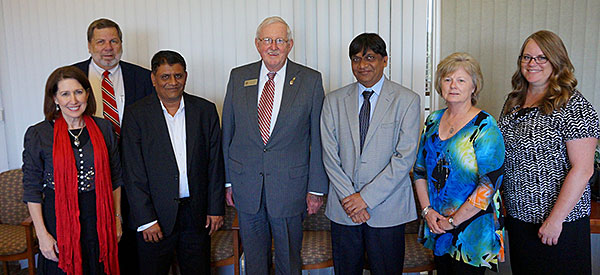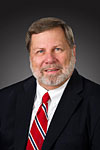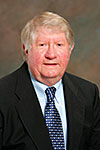UHV welcomes visitors from India to discuss future programs
 |
| University of Houston-Victoria officials pose for a picture with two experts on emotional intelligence from India after a recent meeting about future collaboration. Pictured, from left, are Margaret Rice, a UHV visiting assistant professor of adult and higher education; Fred Litton, dean of the UHV School of Education & Human Development; Ashis Sen, a manager at Hindustan Petroleum Corp. Ltd.; UHV Interim President Vic Morgan; Pushp Joshi, a manager at Hindustan Petroleum Corp. Ltd.; Sandy Hybner, senior coordinator of recruitment and marketing in the School of Education & Human Development; and Joann Olson, an assistant professor of adult and higher education. |
Two experts on emotional intelligence from India recently made contact with the University of Houston-Victoria School of Education & Human Development.
 |
| Fred Litton |
Ashis Sen and Pushp Joshi, both high-level managers in Hindustan Petroleum Corp. Ltd. from Mumbai, India, and organizers of the Forum for Emotional Intelligence Learning came to UHV as part of an effort to form international connections with institutes of higher education in the U.S., said Fred Litton, dean of the UHV School of Education & Human Development.
In particular, the visitors wanted to examine the possibility of collaborating with UHV in the study and coaching of emotional intelligence, the learned ability to think constructively and act wisely.
“The people who developed the emotional intelligence coaching certificate program in our school have been to India and have done a lot of training,” Litton said. “Now, we’re hoping to start a collaborative effort to improve our program by working with international experts.”
The visitors came earlier in October to UHV. Attending the meeting were Litton; UHV Interim President Vic Morgan; Margaret Rice, special assistant to the provost and visiting assistant professor of adult and higher education; Sandy Hybner, senior coordinator of recruitment and marketing in the School of Education & Human Development; Joann Olson, assistant professor of adult and higher education; Darwin Nelson, principal with Emotional Intelligence Learning Systems; and Gary Low, professor emeritus of education from Texas A&M University-Kingsville.
 |
| Gary Low |
“It was a very productive meeting,” said Low, who also is a principal with Emotional Intelligence Learning Systems of Corpus Christi. “It truly is my hope that some good connections have been made. The development of some programs that are mutually beneficial to colleges in India and UHV would be wonderful.”
Low suggested Sen and Joshi visit UHV because of Low’s previous work with the university in the area of emotional intelligence. The School of Education & Human Development hosted a symposium on the topic in 2012, and EILS partnered with the school to develop a series of graduate courses in professional coaching as part of the Master of Education in adult and higher education. The Adult and Higher Education program began teaching the courses in fall 2013.
Hindustan Petroleum is a global Fortune 500 company, and EILS has worked with the company and the Forum for Emotional Intelligence Learning in India since 2006, Low said.
Sen and another representative from Hindustan Petroleum came to Kingsville for a conference in 2007 and presented a program. They then went back to India and talked about setting up a forum on emotional intelligence there. In 2008, they presented their idea to the company’s CEO and received funding for the Forum for Emotional Intelligence Learning. The forum in India has developed into a world-class association of dedicated practitioners and academicians committed to sustainable development for a peaceful and fulfilling society, Low said. Its mission is “Liberating Human Potential for a Better Tomorrow” with emotional intelligence.
“We’ve really enjoyed and valued the relationship we have with them,” Low said. “It’s so genuine and productive. We’ve collaborated on a book titled ‘Fuelling Success: How HPCL Used Emotional Intelligence to Help its Employees to Grow’ and also delivered quite a few training workshops with senior managers who are mostly engineers within Hindustan Petroleum. We’ve done work with the forum by bringing our models of emotional intelligence to India.”
During the roundtable discussion, a variety of collaboration options were discussed. One possibility was the creation of a faculty exchange program between UHV and universities in India. There also was talk of creating international internships and shared research projects. In addition, UHV would like to use this program as an opportunity to increase the number of international students at the university, Litton said.
“UHV recently appointed a task force to look at international education,” Litton said. “Our goal is to elevate the status of UHV as a destination for students who really want to get an American education experience. We’re moving in that direction, and if we can establish some kind of relationship with an entity in India, that’s going to build our exposure and base to recruit some students to study over here.”
Future collaborative efforts will take time and resources to get started, Litton said. But the discussion did produce one idea that can be implemented quickly. Litton is the editor of the American Journal of Educational Research. It publishes articles from throughout the world to promote what’s happening in education. Sen and Joshi plan to submit an article for publication.
The University of Houston-Victoria, located in the heart of the Coastal Bend region since 1973 in Victoria, Texas, offers courses leading to more than 80 academic programs in the schools of Arts & Sciences; Business Administration; and Education, Health Professions & Human Development. UHV provides face-to-face classes at its Victoria campus, as well as an instructional site in Katy, Texas, and online classes that students can take from anywhere. UHV supports the American Association of State Colleges and Universities Opportunities for All initiative to increase awareness about state colleges and universities and the important role they have in providing a high-quality and accessible education to an increasingly diverse student population, as well as contributing to regional and state economic development.
Lauren Hightower-Emerson
361-570-4342




